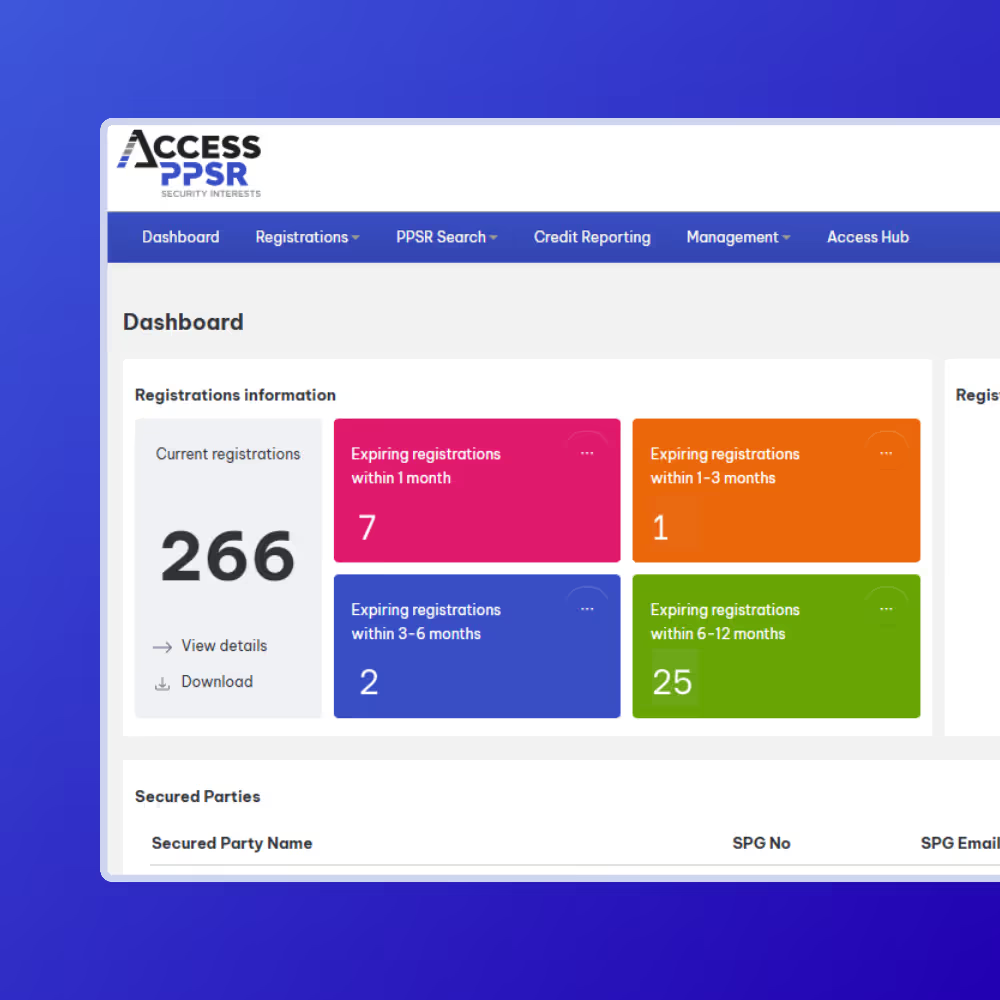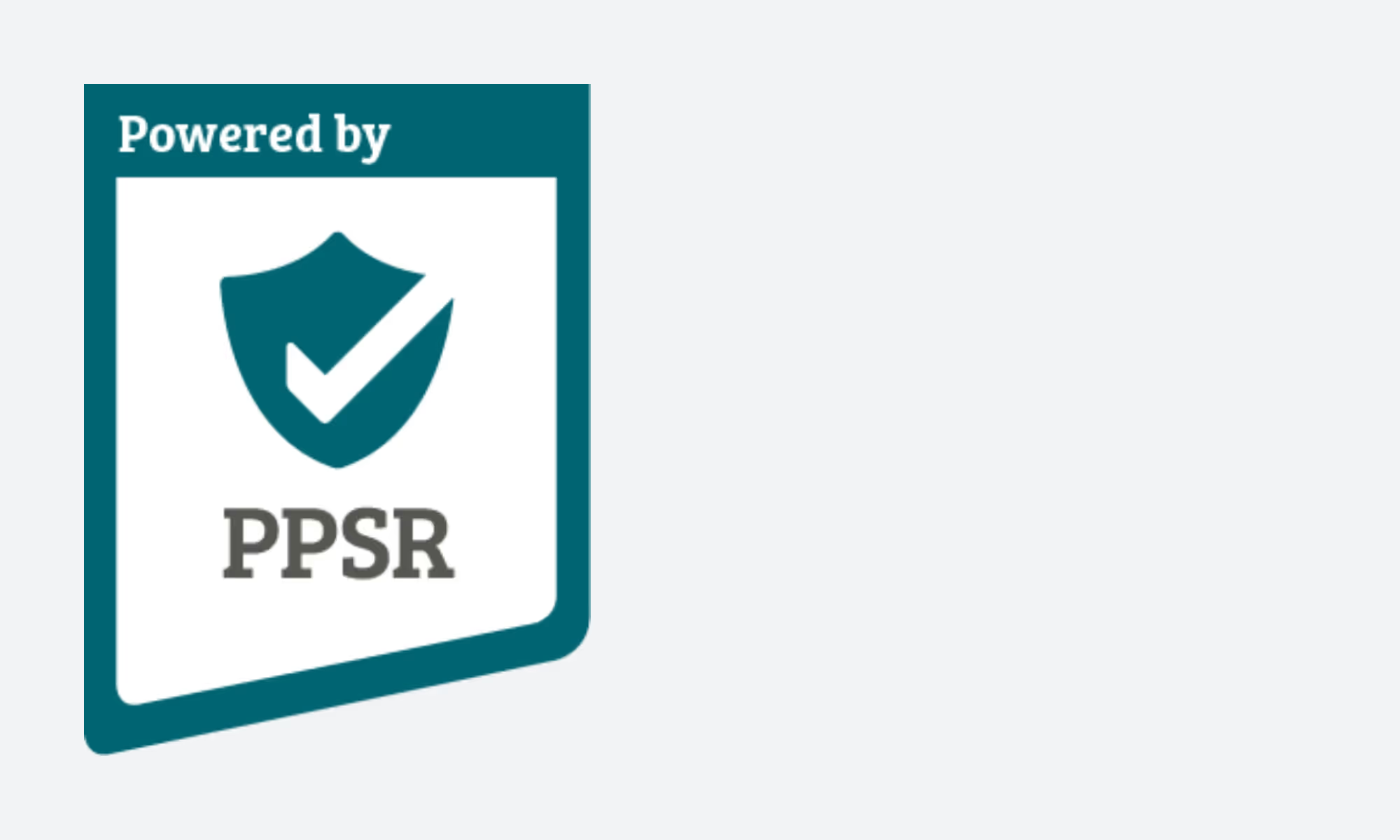simplifying the complexity of PPSR registrations
Access Intell simplifies the complexity of PPSR registrations through automation. Ensure your business protects their security interests against insolvent customers with accurate registrations. Easy, effective and low-cost.

Trusted by leading finance teams








Do you sell goods on credit, hire equipment, or finance assets?
You may be at risk. Registering an interest on the government’s Personal Property Securities Register (PPSR) is the only way to obtain legal rights (and priority) to your supplied goods. In the event of customer insolvency, you become a secured creditor and are first in line for payment. Cost is minimal and security usually lasts for seven years.
Before Access Intell
After Access Intell
Expert service and support
Access Intell is more than just software: our team of experts are here to support you. Our onboarding process ensures we understand your business, how you trade and that you have the required clauses in your terms and conditions to secure your interests. Our set up process includes pre-set profiles and built-in validation tools, enabling one click registrations that are right every time.

An accurate, efficient process for you
One-click registrations are right every time with our pre-set profiles and built-in validation tools. This ensures your security is correct and enforceable as a priority. Plus you can save time and ensure accuracy with our bulk upload tool that automatically validates and corrects large volumes of registrations, discharges, transfers and renewals.

Simple, Centralised Management
Centralised hosting of current and discharged/expired registrations means you can effortlessly manage your interests. Our visual dashboard provides simplified portfolio management through expiration alerts, processing tools and reporting capabilities.




What is the Personal Property Securities Register (PPSR)?
The PPSR is the online government noticeboard that facilitates the registration and searching of security interests. A security interest is a legal right a creditor (you) can have over a customer’s property (e.g. supplies or equipment), acting as collateral for the debt. Why register?
A PPS registration is the legal way to register your rights (and priority) over your goods. Cost is minimal and security lasts for 7 years.
If you do not register an interest, you may find that someone else’s claim to the same assets will rank ahead of your own in the event of customer insolvency.
When insolvency occurs, registration will ensure a supplier is treated as a secured creditor. Failure to register will likely ensure a suppliers security interest is placed towards the bottom of the list.
A registration on the PPSR means that administrators, liquidators and receivers are obligated to contact the supplier upon appointment.
Ultimate Guide to PPSR
Everything you need to know about the PPSR and how to protect your business against bad debts from insolvent customers.

We’ll have you onboarded and registering within 24 hours. Our flexible product integrates seamlessly with your unique business structure, processes and risk profile.
Explore the unique features and benefits Access Intell brings to companies like yours
Client testimonials
Our clients say we go above and beyond – hear what they have to say.

Linda Lambe
Owner, Freedom Forklifts

Alexa Omany
Group Legal Counsel and Company Secretary, Ultimate Positioning Group

Natalie Webber
National Credit Manager, Volvo Group Australia

Leon Dodd
General Manager

Velocity Vehicle Group Australia
Karen Legett, Credit Manager

Aron Narayan
Financial Controller, Hurford Wholesale

Paul Burgess
National Credit Manager, Steelforce Australia
The Personal Property Securities Register (“PPSR”) is an online government register of security interests which went live in January 2012. The PPSR combined 40 or so separate registers, including the Register of Encumbered Vehicles (REVS) and the ASIC register of company charges. This resulted in a single national register that anyone can access to register a security interest, or to search whether a security is registered.
The Personal Property Securities Act 2009 (“PPSA”) was introduced on 30 January 2012. Its purpose was to provide a comprehensive regulatory framework governing the laws relating to the taking, and the granting, of security in Australia. The Personal Property Securities Register (“PPSR”) went live that same day. The PPSA unified over 70 separate legislative and common law rules governing personal property security. The PPSR combined 40 or so separate registers. The result was a single national register that anyone can access to register a security interest or to search whether a security is registered.
The term ‘personal property’ can be misleading. Under the PPSA legislation it should be regarded as being any property that is not ‘real property’ (i.e. that is not land or buildings). This may include general property, tangible, intangible and financial property. Once supplied or financed, the personal property in question is referred to as ‘collateral’ within the PPSA.
The individual or entity that holds the security and places the registration is called the ‘secured party’, ‘secured party group’, or ‘SPG’ for short.
The ‘grantor’ is the party that the registration is placed against. For example, they are usually the buyer of goods on credit terms, the borrower of money in a finance transaction or the party that is hiring equipment. They are called a ‘grantor’ because they have ‘granted’ the security interest to the ‘secured party’. Our free Resource Guide to PPSR Grantor Identification Rules is a comprehensive guide to selecting the correct PPSR grantor identifier.
A registration can cost as little as $7 and usually lasts for seven years. It's a cost-effective way to become a secured creditor and be first in line for payment. We'd be happy to chat about your business's circumstances.
Depending on the hire agreement terms, you might need to. In most longer-term hire cases (and some short-term hires), failure to register could mean that you lose your equipment to the insolvent estate of your customer. It is vital to understand this aspect of PPSA and put in place the necessary protections. The consequences of not doing so could be disastrous.
It is always of benefit to register on PPSA when you sell goods on credit terms subject to retention of title. The extent of that benefit depends on what you sell, how you sell it and who you sell it to. Registration means you recover the sold stock that is still on your customers premises, as well as stock that is incorporated into their process or products as raw materials; or, finished goods and even debts created from the sale of your goods to their customers. The benefits are enormous in the majority of cases. For most retention of title suppliers, the cost to register is minimal and lasts for at least 7 years.
In most cases, registering on PPSR is of little value when services are provided because, unlike the supply of goods, you cannot re-take possession if you don’t get paid. For example, if you perform grass cutting duties for a customer you cannot undo the work done or take it back. However if it has created value, in the form of a debt (e.g. your customer has on-sold your service), you have a right to the debt if you have security and register. Our team would be happy to explore the benefits of registration with any potential secured party – please contact us.
In most cases, yes. When you register on PPSR you become a secured creditor. The Unfair Preference legislation, covered under Section 588 of the Corporations Act, enables liquidators to ‘claw back’ payments made to unrelated entities in the six months prior to insolvency when that money should have been available for all ordinary unsecured creditors equally. By registering on PPSR and becoming a secured creditor, you fall outside that group.
Yes, it can. If you register against all customers on PPSR they will be unable to sell the business without the buyer accepting existing security. In most cases the buyer will require a discharge, and so you will find that they pay you so that can be obtained.
Ready to Get paid, faster?
Contact us to start automating the management of your PPSR registrations.
